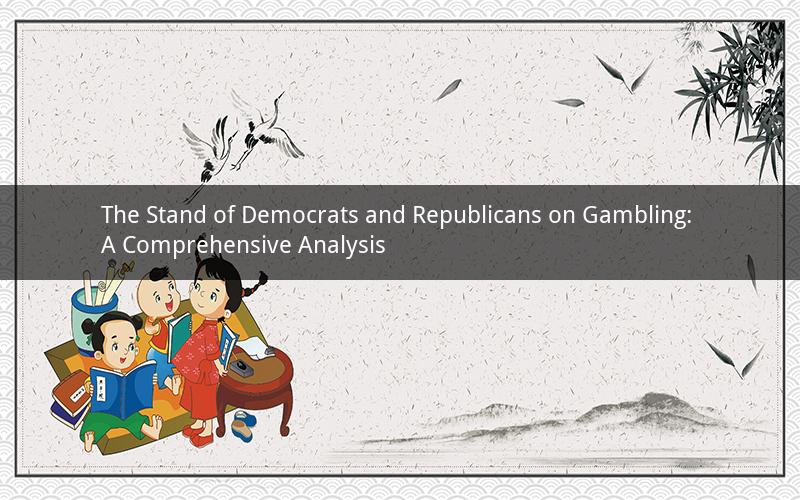
In recent years, the debate over gambling has intensified, with Democrats and Republicans presenting diverse viewpoints. This article delves into the stance of both parties on gambling, highlighting their key positions, and examining the potential impact of their policies.
I. Democrats' Stance on Gambling
1.1 Support for Legalized Gambling
Democrats generally favor the legalization and regulation of gambling. They argue that legalizing gambling can bring economic benefits to states, including job creation, increased tax revenue, and funding for social services.
1.2 Emphasis on Responsible Gambling
Democrats also emphasize the importance of responsible gambling. They believe that proper regulations can help protect vulnerable individuals from the negative consequences of gambling addiction.
1.3 Focus on Problem Gambling Treatment
In addition to responsible gambling, Democrats advocate for the development and implementation of programs to address problem gambling. They believe that these initiatives can help those affected by gambling addiction receive the necessary support and treatment.
II. Republicans' Stance on Gambling
2.1 Mixed Views on Legalization
Republicans have a more varied stance on gambling, with some supporting its legalization and others opposing it. Those in favor argue that gambling can provide economic benefits and boost state budgets. However, those against believe that gambling can lead to addiction, crime, and other negative societal impacts.
2.2 Concerns about Problem Gambling
Regardless of their position on legalization, many Republicans share concerns about problem gambling. They argue that strict regulations are necessary to mitigate the risks associated with gambling, particularly for vulnerable populations.
2.3 Emphasis on State's Role in Regulation
Republicans often emphasize the role of states in regulating gambling. They believe that individual states should have the autonomy to decide whether to allow gambling within their borders, rather than imposing a federal mandate.
III. The Impact of Democrats' and Republicans' Stances on Gambling
3.1 Economic Impacts
Both Democrats and Republicans agree that gambling can generate economic benefits for states. However, they differ in their approaches to maximizing these benefits. Democrats tend to focus on comprehensive regulation and responsible gambling practices, while Republicans emphasize state autonomy and a lighter regulatory hand.
3.2 Social and Moral Impacts
The social and moral impacts of gambling are a significant concern for both parties. Democrats generally advocate for a balanced approach that promotes economic benefits while mitigating negative consequences. Republicans, on the other hand, may place a greater emphasis on states' rights and the potential risks associated with gambling.
3.3 Policy Implementation and Enforcement
The effectiveness of gambling policies is contingent on their implementation and enforcement. Both parties recognize the importance of effective regulation, but they may have different approaches to achieving this goal.
Questions and Answers:
1. What are the primary reasons why Democrats support the legalization of gambling?
Answer: Democrats generally support the legalization of gambling due to its potential economic benefits, such as job creation and increased tax revenue, as well as its potential to fund social services.
2. How do Democrats address the issue of problem gambling?
Answer: Democrats advocate for the development and implementation of programs to address problem gambling, emphasizing responsible gambling practices and the need for proper regulation to protect vulnerable individuals.
3. What is the main difference between the Republican and Democratic stances on the role of the federal government in regulating gambling?
Answer: Republicans often emphasize the role of states in regulating gambling, advocating for state autonomy and the ability of individual states to decide whether to allow gambling within their borders. Democrats generally favor a more centralized approach, focusing on comprehensive regulation and federal oversight.
4. How do both parties balance the economic and social impacts of gambling?
Answer: Democrats typically emphasize a balanced approach that promotes economic benefits while mitigating negative consequences, such as problem gambling. Republicans may place a greater emphasis on states' rights and the potential risks associated with gambling.
5. What are the potential challenges in implementing effective gambling policies?
Answer: Implementing effective gambling policies can be challenging due to the need for balanced regulation, addressing problem gambling, and ensuring enforcement of policies. Both parties must navigate these challenges to create policies that maximize economic benefits while minimizing negative social impacts.